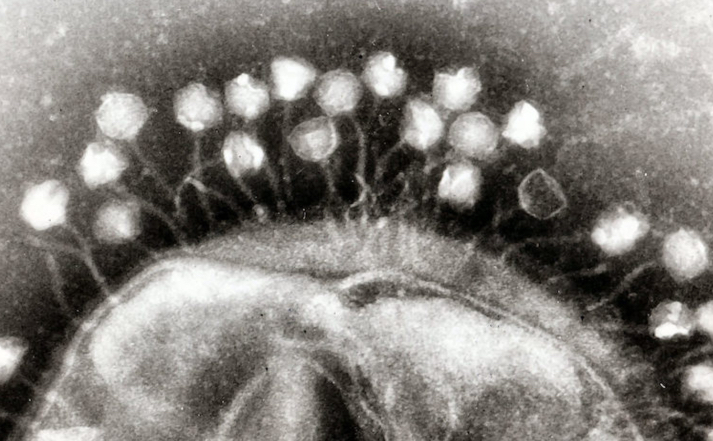
One of the last remaining bastions for organic chemists in pharmaceuticals is in antibiotic development. It is now under fire from a partnership of academic and industrial microbiologists, who are developing bacteriophages into antibacterial therapies.
A team of researchers headed by Dr. Janet Neal and Prof. Martha Clokie at the University of Leicester demonstrated the antibacterial efficacy of a bacteriophage cocktail developed by AmpliPhi, a California-based biotech. In their larval model, the cocktail worked as a prophylactic to deter Clostridium difficile infections, and when combined the vancomycin, the therapy markedly reduced colonisation. The results have been published in Frontiers in Microbiology.
Prof. Clokie explains,“The results suggest that it may be possible to reduce the threat of C. difficile, and potentially other bacterial infections, through the use of phage both prophylactically to prevent infection, and therapeutically once an infection is established. Phage therapy targets specific pathogenic bacterial populations while sparing the beneficial microbiome.”
Indeed, the specificity of bacteriophages is a key selling point of developing them into a therapy: a major setback of chemical antibiotics is that they do not discriminate between bacterial friends and foes, harming immunity-boosting flora as well as the invaders. In fact, it is this vulnerability that provides a window for a C. difficile infection, which is generally recognizable as colitis.
Bacteriophages are naturally occurring viruses that develop high selectivity for certain bacteria. When they acquire their target, they rapidly kill the host and replicate to locally amplify their presence, resulting in a powerful local response to an infection. Bacteriophages can also pierce biofilms, which are a critical line of defense for invading bacteria and play a role in antibiotic resistance. Unlike their chemical counterparts, bacteriophages would not only spare beneficial flora but also counteract antibiotic resistance.

Given the great potential of the cocktail, AB-PA01, the CEO of AmpliPhi, Scott Salka, says the “findings underscore our enthusiasm for the potential of our proprietary platform to enable the development of therapeutics to treat a broad range of bacterial infections that are resistant or have suboptimal responses to current antibiotic therapies.”
Pherecydes Pharma is a French biotech that launched the first EU clinical bacteriophage phase I/II trial to fight hospital acquired infections (HAIs) in military hospitals and burn units. Bacteriophages were quite popular in Russia and the old Soviet bloc, while chemical antibiotics took over in the West. Pherecydes has since picked up the baton, and now boasts the world’s largest library of phages engineered to fight E. coli. Read more about how French microbiology is taking on infectious disease in our interview with Auriga Partners.
Bacteriophages as antibacterial therapies are an exciting new development in antibiotics, but their increasing presence in the field is another nail in the coffin for organic chemistry in pharmacy. Antibiotics, once exclusively the purview of synthetic organic chemists, could soon go the way of the rest of the pharmaceutical industry and become the domain of biologists.
Source: labiotech.eu


